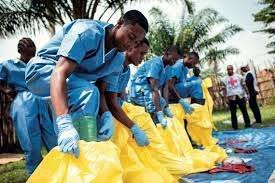News
Nigeria boosts Ebola alert as outbreak hits DRC

The Nigeria Centre for Disease Control and Prevention (NCDC) assured Nigerians there are no confirmed cases of Ebola Virus Disease (EVD) in the country.
This statement comes amid reports of a new Ebola outbreak in the Democratic Republic of Congo (DRC).
This Director-General of the NCDC, Dr. Jide Idris, disclosed this in a public health advisory issued Saturday in Abuja that Nigeria was on high alert, enhancing surveillance at entry points, healthcare facilities, and communities.
Nigeria’s only Ebola outbreak occurred in 2014, when the virus was imported from Liberia by a traveler, resulting in 20 cases and eight deaths before successful containment.
The DRC Ministry of Health confirmed 28 suspected Ebola cases and 15 deaths on September 4 in Kasai Province, including four health workers, identifying the Ebola Zaire strain as the outbreak’s cause.
The outbreak has spread across Bulape and Mweka health zones and recorded a mortality rate of 57 per cent, raising concerns over the disease’s high fatality and potential for further spread.
According to Idris, there are currently no cases of Ebola in Nigeria, but preparedness has been intensified with infection control, border checks, and community risk communication to prevent importation and transmission.
He further noted the DRC activated its Public Health Emergency Operations Centre and deployed a rapid response team, receiving support from the World Health Organisation (WHO) to contain the outbreak effectively.
Idris also said the Ebola Zaire strain identified had an approved vaccine, Ervebo, which had been proven effective in controlling outbreaks and protecting vulnerable populations in affected regions.
To protect Nigerians, he urged frequent handwashing with soap and water as regular hygiene, a key preventive measure to reduce transmission risk from contact with infected surfaces or individuals.
He advised avoiding physical contact with anyone showing symptoms such as fever, vomiting, or unexplained bleeding, which were common signs of Ebola infection and warranted immediate medical attention.
Idris warned against consuming raw or undercooked bushmeat and cautioned against contact with fruit bats, monkeys, and apes, which were known reservoirs for the Ebola virus in wildlife.
He encouraged Nigerians to report suspected Ebola cases or unusual illnesses, especially among those with recent travel to affected areas, by calling the NCDC toll-free line 6232 for prompt response.
Healthcare workers were advised to maintain a high index of suspicion, strictly follow infection prevention protocols, and report any suspected cases immediately to aid rapid containment and treatment efforts.
Idris further issued travel advice, urging Nigerians to avoid all but essential trips to countries currently experiencing Ebola outbreaks to minimise the risk of exposure and disease importation.
He assured the public that NCDC would provide timely updates while collaborating with international partners to monitor the evolving situation in the DRC and other affected African regions.
NAN



